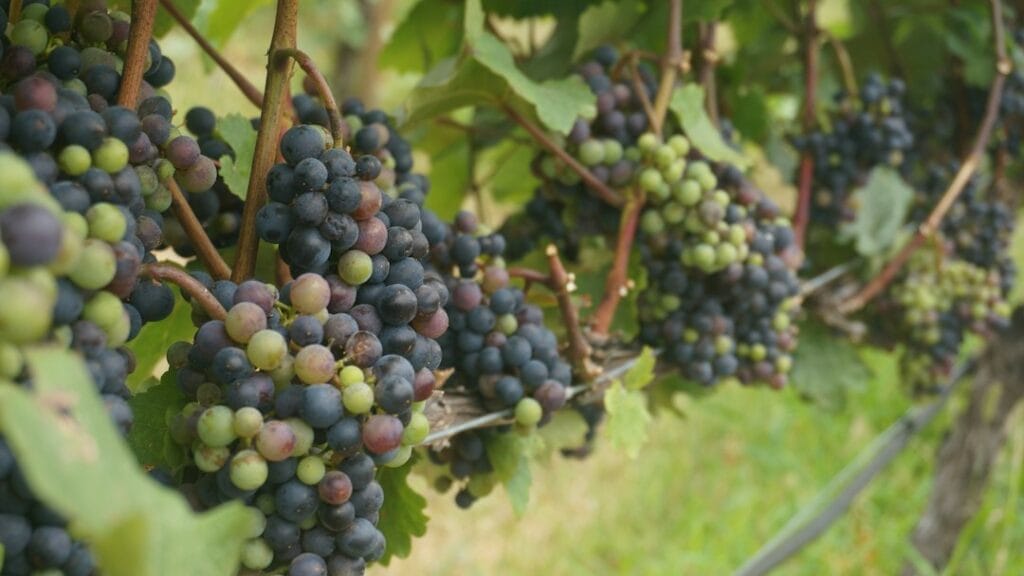Can dogs eat grapes? The short answer: absolutely not. While you might enjoy munching on a bunch of juicy grapes, these seemingly harmless fruits are like kryptonite to your furry friend. They’re not just bad for dogs; they’re downright toxic.
Digging into the dangers, you’ll discover that every single grape—no matter its color or size—is a potential hazard. Even raisins sneak in with their own share of risks.
If your dog snatches one off the floor or from an unattended bowl, knowing what signs to watch for could save their life. Quick recognition and even quicker action are critical here.
This isn’t about scaring you—it’s about arming you with knowledge so that both snack time and playtime stay safe for your beloved pooch.
Table Of Contents:
- Can Dogs Eat Grapes? Understanding the Risks
- Recognizing Symptoms of Grape Poisoning in Dogs
- Immediate Actions if Your Dog Consumes Grapes
- Types of Grapes That Pose a Threat to Dogs
- Treatment Protocols for Grape Poisoning in Dogs
- The Scientific Quest Behind Grape Toxicity
- Safeguarding Your Pet from Accidental Grape Ingestion
- Nutritious Alternatives to Grapes for Canine Snacks
- Stay Away from Grapes
Can Dogs Eat Grapes? Understanding the Risks
You might think a juicy grape could be a refreshing treat for your furry friend on a hot day but hold that thought. Grapes are toxic to dogs, and it’s not just hearsay; every type of grape – red or green, seedless or not – is like kryptonite to our canine pals. This includes all those sneaky grapes hiding in raisins, which can show up uninvited in everything from hot cross buns to fruit cake.
The whole “grape toxicity” thing has vets scratching their heads because no one really knows what makes these fruits so dangerous. But we do know this: even munching on a single grape can send your dog down a rough path, leading to kidney failure if left untreated. And don’t get me started on wine grape juice; keep that fancy stuff well out of paw’s reach.
If you ever catch your pooch snacking on something it shouldn’t have, act fast. Did your dog eat grapes? Call the vet or dash over to an animal poison control center right away.
If you have non-urgent questions about the health of your bearded dog, you can sign up for an online vet consultation with Ask A Veterinarian. They are available 24/7 to answer questions.
To avoid unexpected health costs, check out Pet Assure Mint.
Recognizing Symptoms of Grape Poisoning in Dogs
If your dog is sick after scarfing down some grapes, it’s time to sit up and take notice. Eating grapes can hit dogs hard with symptoms that scream trouble. Think vomiting or diarrhea—these are often the first red flags waving at you.
Ate grape lately? Your pup might show signs like tummy pain and weakness or suddenly act as if water is going out of style due to excessive thirst. Keep an eye on their pee breaks, too; changes in urination frequency could be whispering “grape poisoning.” And we’re not talking about a little upset stomach here—if left unchecked, this situation can slide south fast.
So what do you do when Fido snags a single grape from the kitchen floor? First off, don’t wait for severe signs like dry nose or decreased urine production to make an appearance. Reach out pronto to the ASPCA poison control center because earlier treatment could save your furry friend from serious kidney damage—or worse.
Immediate Actions if Your Dog Consumes Grapes
Your heart might skip a beat when you realize your pup has snagged a grape off the kitchen floor. Take a deep breath because time is of the essence here.
If your dog ate grapes, fast action could save their life. The first thing to do is contact your vet. They know what’s up and can guide you through possibly inducing vomiting under their supervision—a crucial step in preventing poison from doing more harm than good.
The clock’s ticking, so let’s not dance around it—vomiting and/or diarrhea are clear signs that things aren’t right inside Fido’s belly. But these symptoms can mean many things; maybe they just scarfed down their kibble too quickly again. However, after munching on even a single grape or its dried buddy, the raisin, this situation becomes way more serious. So call that vet pronto.
Types of Grapes That Pose a Threat to Dogs
It’s crucial for dog owners to know that their furry friends should never eat grapes. This includes all types: green grapes, red grapes, and seedless grapes. They’re all off-limits because they can be seriously harmful to your pup’s health.
Dried forms like raisins are just as dangerous as their fresh counterparts—maybe even more so because dogs can gobble up large amounts quickly without you noticing. Think twice before leaving that fruit cake or hot cross buns unattended; these seemingly innocent treats could lead to an emergency vet visit if they contain any form of dried grape.
To keep your best friend safe, always make sure these toxic fruits are out of paw’s reach. And remember, in the unfortunate event your dog does get into them, speed matters—contacting the ASPCA Poison Control Center right away is key for early treatment and better outcomes.
Foods Containing Hidden Grape Dangers
Do you think your pantry is safe for your four-legged friend? You might be surprised. Many of our favorite baked treats, like hot cross buns and fruit cake, are loaded with dried fruits that spell trouble for dogs. Even a tiny bit can cause Fido a world of hurt.
Let’s say you’re whipping up some festive goodies. That dough may have raisins sneaking around—raisins are just grapes in disguise, remember? And those grapes could cause anything from tummy troubles to serious kidney issues if Rover gets his paws on them. Imagine: one minute, they’re snagging a crumb off the floor; the next, you could be dialing the pet poison helpline faster than you can say “No.”
Sure, we all know about fresh grapes being bad news bears for pups, but it’s not just the plump ones sitting pretty in your fruit bowl—you’ve got to watch out for things like wine grape juice, too. So before pouring yourself a glass or baking those delicious seasonal treats, think about where those curious noses might wander and keep an eye out for any fallen soldiers from the vine.
Treatment Protocols for Grape Poisoning in Dogs
Delves into the veterinary approaches for treating a dog that has ingested toxic amounts of grapes or raisins.
Inducing Vomiting
When a dog eats grapes, time is not on your side. Acting fast can mean the difference between relief and kidney damage. The first step vets often take to treat grape poisoning is inducing vomiting—provided it’s within a couple of hours since ingestion.
Immediate Action
If you find yourself saying, “My dog ate grapes.” don’t wait; start treating immediately by contacting your vet or calling an animal poison control center like ASPCA Poison Control Center for guidance. They may advise bringing them in right away or give instructions over the phone depending on how much was eaten and how long ago.
Hospitalization and Fluid Therapy
In more severe cases where dogs develop symptoms such as decreased urine production or show signs of kidney damage, hospitalization might be necessary. Here, they’ll receive fluid therapy to flush out their system and protect those precious kidneys from further harm. If left untreated, grape toxicity can escalate quickly so early detection followed by prompt treatment increases chances of recovery significantly.
Learn more about azotemia and uremia here.
The Scientific Quest Behind Grape Toxicity
As pet lovers, we’ve been puzzled by the fact that a seemingly innocent snack like grapes can be deadly to our furry friends. Recent research has zeroed in on tartaric acid—a component naturally found in grapes—as a potential villain behind this toxicity. While not all dogs react to grape ingestion, those who do may experience kidney failure or significant kidney damage.
Scientists are digging deeper into why some dogs suffer after eating just a single grape while others might munch away without immediate severe signs. This variability could stem from differing levels of tartaric acid present across various types and batches of grapes. It’s an ongoing investigation, but understanding these nuances is critical because early detection and treatment greatly improve outcomes for affected pooches.
Dog owners should stay informed about such findings through reliable sources like the ASPCA Animal Poison Control Center. They offer updates on canine health threats and help us keep our four-legged companions safe from harm’s way—because, let’s face it, they count on us just as much as we treasure their unconditional love.
Safeguarding Your Pet from Accidental Grape Ingestion
Imagine a fruit so common, yet it could be like kryptonite to your furry friend. That’s right, even one single grape can cause a world of trouble for dogs. Grapes are deceptive; they’re healthy for humans but spell disaster in the canine world. So let’s talk about keeping those fresh grapes and their sneaky counterparts – dried fruit, out of paw’s reach.
We know dogs have their ways of scavenging treats that aren’t meant for them, making vigilance with fallen fruit crucial around our homes and yards. A raisin dropped here or there might seem harmless, but these dried fruits pack the same toxic punch as their hydrated relatives.
The trick is not just to protect our pets from what we offer but also what they may find on their own. It means educating everyone in the household about why sharing that juicy bite isn’t caring when it comes to grapes or raisins – because knowing better can prevent pet poison helpline calls later on.
ASPCA Poison Control Center stresses education as a defense against accidental ingestion; make sure all family members understand this essential rule: keep all forms of this dangerous snack – including goodies like hot cross buns containing hidden dangers – far away from Fido’s curious nose.
Nutritious Alternatives to Grapes for Canine Snacks
Ditch the fresh grapes and skip straight to dog treats that won’t send you dialing the ASPCA Poison Control Center. Would you play roulette with your furry friend’s health? Of course not. So, let’s talk about safe snacking.
For a start, how about some crunchy carrots or apple slices (minus the seeds)? They’re like nature’s toothbrushes for dogs. And don’t forget blueberries; they’re small but mighty antioxidants that are perfectly sized for treating. Just make sure these alternatives stay out of reach when not snack time – we wouldn’t want any four-legged friends helping themselves.
If DIY is more your style, whip up some homemade peanut butter pumpkin treats – just ensure that peanut butter is xylitol-free and pumpkins are plain without added spices. But remember, moderation is key because even good things can turn bad in large amounts – nobody wants a case of doggy diarrhea. For those moments when only store-bought will do, choose high-quality commercial dog treats specifically formulated as substitutes for dangerous human foods.
Stay Away from Grapes
No way. Not even one. Grapes are a danger to your dog’s health, and now you know it.
Remember the risks; every grape is a ticking time bomb for your pet. Raisins too—don’t let their size fool you.
Keep an eye out for troubling signs: vomiting, diarrhea, pain in the tummy. Quick action could be what saves them.
Talk about this with everyone at home—it’s how we keep our pets safe from accidental snacking disasters.
If they do get into grapes or raisins, though, call that vet pronto! Earlier treatment might just prevent kidney damage or worse.
In all of this remember tartaric acid—the potential bad guy in the story of grapes and pups—and why more research matters so much right now.

